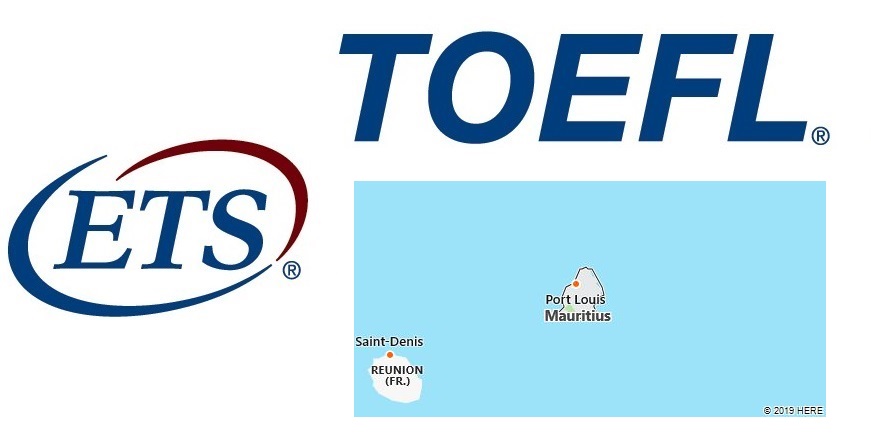The TOEFL iBT test is offered in this location.
The list below shows testing regions, fees and dates as of February 15, 2019, but availability may change when you register. Fees are shown in US$ and are subject to change without notice.
| Region | Testing Format | Fee | Test Dates |
|---|---|---|---|
| Mauritius | TOEFL iBT | $190 $190 $190 $190 $190 $190 $190 $190 $190 $190 $190 $190 |
Sat., Mar 09, 2019 Sat., Mar 16, 2019 Sat., Mar 30, 2019 Sat., Apr 06, 2019 Sat., Apr 13, 2019 Sat., May 11, 2019 Sat., May 18, 2019 Sat., Jun 01, 2019 Sat., Jun 15, 2019 Sat., Jun 29, 2019 Sat., Jul 06, 2019 Sat., Jul 13, 2019 |
Mauritius Overview
Mauritius, island nation in the Indian Ocean, east of Madagascar. The cultivation and processing of sugar cane, the textile industry and tourism are the main industries in the country. 68% of the population are of Indian origin.
Mauritius became famous for stamp misprints in 1847, of which only a few came on the market. The blue Mauritius, a two-pence stamp, of which only twelve are known, is one of the greatest treasures among the Postage stamps.
History: Mauritius, already known to the Arabs and Malays, was first visited by Europeans in 1510. It came into Dutch possession in 1598, France in 1715, and Great Britain in 1810. It has been an independent state in the Commonwealth since 1968 (republic since 1992).
Country facts
- Official name: Republic of Mauritius
- License plate: MS
- ISO-3166: MU, MUS (480)
- Internet domain:.mu
- Currency: 1 Mauritius rupee (MR) = 100 cents
- Area: 2040 km²
- Population (2019): 1.3 million
- Capital: Port Louis
- Official language (s): English
- Form of government: Parliamentary republic in the Commonwealth
- Administrative division: main island and 3 dependencies
- Head of State: President Prithvirajsing Roopun (since December 2, 2019)
- Head of Government: Pravind Jugnauth (since January 24, 2017)
- Religion (s) (2011): 49% Hindus, Christians (26% Catholics, 6% other Christians), 17% Muslims, 2% other / n / a
- Time zone: Central European Time +3 hours
- National holiday: March 12th
Location and infrastructure
- Location (geographical): South Africa
- Position (coordinates): between 10 ° and 20 ° 30 ‘south latitude and 56 ° 40’ and 63 ° 30 ‘east longitude
- Climate: Tropical-maritime climate
- Highest mountain: Piton de la Rivière Noire (826 m)
- Road network (2015): 2,379 km (paved), 49 km (unpaved)
Population
- Annual population growth (2020): 0.5%
- Birth rate (2020): 12.6 per 1000 inh.
- Death rate (2020): 7.3 per 1000 residents.
- Average age (2020): 36.3 years
- Average life expectancy (2020): 76.5 years (men 73; women 80.1)
- Age structure (2020): 19.4% younger than 15 years, 11.1% older than 65 years
- Literacy rate (15-year-olds and older) (2018): 91.3%
- Mobile phone contracts (pre-paid and post-paid) (2018): 151 per 100 residents
- Internet users (2018): 59 per 100 residents
Economy
- GDP per capita (2019): US $ 11,361
- Total GDP (2019): $ 14 billion
- GNI per capita (2019): US $ 12,740
- Education expenditure (2018): 4.8% of GDP
- Military expenditure (2018): 0.2% of GDP
- Unemployment rate (15 years and older) (2019): 6.7%
Education
The country has a well-developed education system. There is general compulsory schooling from 6 to 16 years old with free lessons. The school system is divided into a six-year primary school and a two-level secondary school (level I: 3 years, level II: 4 years). In addition to the secondary schools, there are vocational and technical schools. The languages of instruction are English and French. Higher education includes the University of Mauritius (founded in 1965), the Mahatma Gandhi Institute, and the University of Technology (founded in 2001).
Media
The media are multilingual. The press in particular covers a wide range of opinions. Daily newspapers with the highest circulation, “L’Express” (founded in 1963, with Sunday edition), “Le Matinal” and “Le Mauricien” (founded in 1908, with Sunday edition “Week-End”). The state broadcasting company Mauritian Broadcasting Corporation (MBC, founded in 1964) broadcasts radio programs in twelve languages and operates three television programs. There are also several satellite television providers. “Radio One”, “Radio Plus” and “top FM” are private radio stations.
Population
The population is characterized by ethnic, cultural and religious diversity. 68% of the population are of Indian origin (descendants of the Indian plantation workers who immigrated in the 19th century), 27% of mixed descent (Creoles), as well as Europeans, Chinese and others. The colloquial language spoken by the majority of the population is a French-based Creole language. With an average of 623 residents per km 2, Mauritius is the most densely populated country in Africa. Most of the population lives in the region between the capital Port Louis and the interior of the island of Mauritius. The proportion of the urban population is 39% (2017).
Religion
The constitution guarantees freedom of religion. The dominant religion is Hinduism, to which almost 49% of the population profess. Over 26% belong to the Catholic Church (exemtes Diocese of Port Louis), more than 6% to Protestant denominations (especially Pentecostals, Presbyterians, Adventists) and the Anglican Church (Indian Ocean Province). The Muslim population group (around 17%) includes Sunnis from the Hanefi school of law and Shiites (Imamites). There are also supporters of the Ahmadija movement. Buddhism and traditional Chinese religions are represented among the Chinese. The Bahais are another religious minority.

